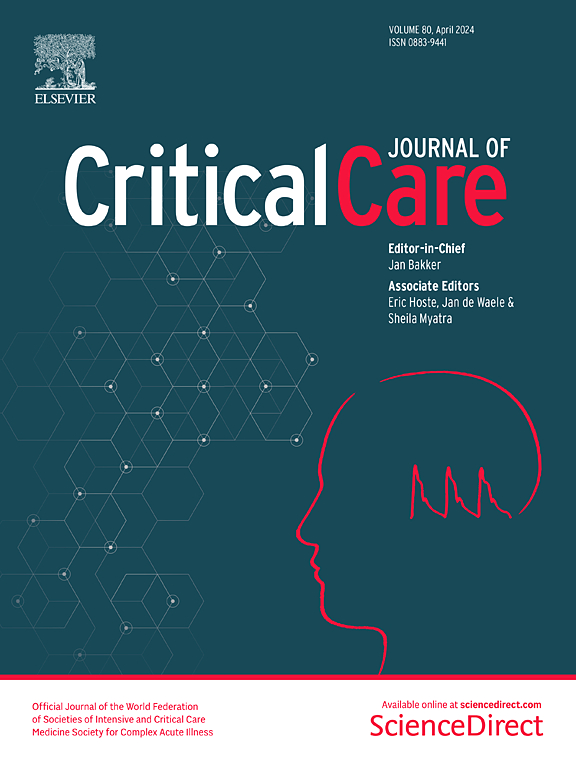任何原因急性呼吸窘迫综合征后认知障碍的患病率和发生率:一项系统回顾和荟萃分析
IF 8.8
1区 医学
Q1 CRITICAL CARE MEDICINE
引用次数: 0
摘要
本系统综述和荟萃分析的目的是综合评估各种原因导致的急性呼吸窘迫综合征(ARDS)后认知障碍发生率的证据。我们系统地检索了 PubMed、Scopus 和 Web of Science 上有关 ARDS 成年幸存者认知障碍的观察性研究。对偏倚风险和证据确定性(GRADE)进行了评估。使用随机效应模型进行了一项荟萃分析,以估计 ARDS 后认知功能障碍的总体患病率,并对 COVID-19 相关 ARDS(C-ARDS)进行了亚组分析。此外,还进行了元回归以评估人口统计学和临床预测因素对认知结果的影响。异质性采用τ2和I2统计量进行评估。我们确定了 14 项研究,共有 1451 名参与者,其中 650 名参与者(范围:13-98)被纳入分析。在C-ARDS亚组中,我们考虑了12项研究,共563名参与者(范围:13-98)。ARDS后认知障碍的汇总患病率为36%(95% CI 26-46%),不同研究之间存在高度异质性(I2 = 92%,τ2 = 0.03)。在C-ARDS队列中,患病率为34%(95% CI 22-45%),异质性水平相似(I2 = 92.7%,τ2 = 0.03)。元回归分析表明,年龄越大,ARDS 后认知障碍的发生率越高(b = 0.02,p = 0.033),从而降低了研究间的异质性(I² = 60.04%,τ² = 0.01)。重症监护室住院时间、性别和从重症监护室出院到认知评估的时间均无明显关联(p > 0.05)。这项荟萃分析证实了之前的研究结果,即认知障碍仍是 ARDS 存活者的一个长期问题。ARDS 后认知功能障碍的普遍性凸显了未来研究的重要性,以揭示导致这些缺陷的复杂内在机制,并为幸存者制定有针对性的预防和康复策略。本文章由计算机程序翻译,如有差异,请以英文原文为准。
Prevalence and incidence of cognitive impairment following acute respiratory distress syndrome of any cause: a systematic review and meta-analysis
The aim of this systematic review and meta-analysis is to synthesize and appraise the evidence on prevalence of cognitive impairment following acute respiratory distress syndrome (ARDS) of any cause. We systematically searched PubMed, Scopus, and Web of Science for observational studies focused on cognitive impairment in adult survivors of ARDS. Risk of bias and certainty of evidence (GRADE) were assessed. A meta-analysis using a random effects model was performed to estimate the overall prevalence of cognitive impairment after ARDS, with subgroup analyses for COVID-19-related ARDS (C-ARDS). Additionally, a meta-regression was conducted to assess the influence of demographic and clinical predictors on cognitive outcomes. Heterogeneity was assessed using τ2 and the I2 statistic. We identified 14 studies with 1451 participants, with 650 participants (range: 13–98) included in the analyses. In the subgroup of C-ARDS, 12 studies with 563 participants (range: 13–98) were considered. The pooled prevalence of cognitive impairment following ARDS was 36% (95% CI 26–46%), with high heterogeneity between studies (I2 = 92%, τ2 = 0.03). In C-ARDS cohorts, the prevalence was 34% (95% CI 22–45%), with similar levels of heterogeneity (I2 = 92.7%, τ2 = 0.03). Meta-regression analysis showed that older age predicted a higher prevalence of cognitive impairment following ARDS (b = 0.02, p = 0.033), reducing between-study heterogeneity (I² = 60.04%, τ² = 0.01). ICU stay, sex, and time from ICU discharge to cognitive assessment showed no significant associations (p > 0.05). This meta-analysis corroborates previous findings that cognitive impairment remains a persistent issue for ARDS survivors. The prevalence of cognitive impairments following ARDS highlights the importance of future research to unravel the complex underlying mechanisms contributing to these deficits and to develop targeted strategies for prevention and rehabilitation in survivors.
求助全文
通过发布文献求助,成功后即可免费获取论文全文。
去求助
来源期刊

Critical Care
医学-危重病医学
CiteScore
20.60
自引率
3.30%
发文量
348
审稿时长
1.5 months
期刊介绍:
Critical Care is an esteemed international medical journal that undergoes a rigorous peer-review process to maintain its high quality standards. Its primary objective is to enhance the healthcare services offered to critically ill patients. To achieve this, the journal focuses on gathering, exchanging, disseminating, and endorsing evidence-based information that is highly relevant to intensivists. By doing so, Critical Care seeks to provide a thorough and inclusive examination of the intensive care field.
 求助内容:
求助内容: 应助结果提醒方式:
应助结果提醒方式:


